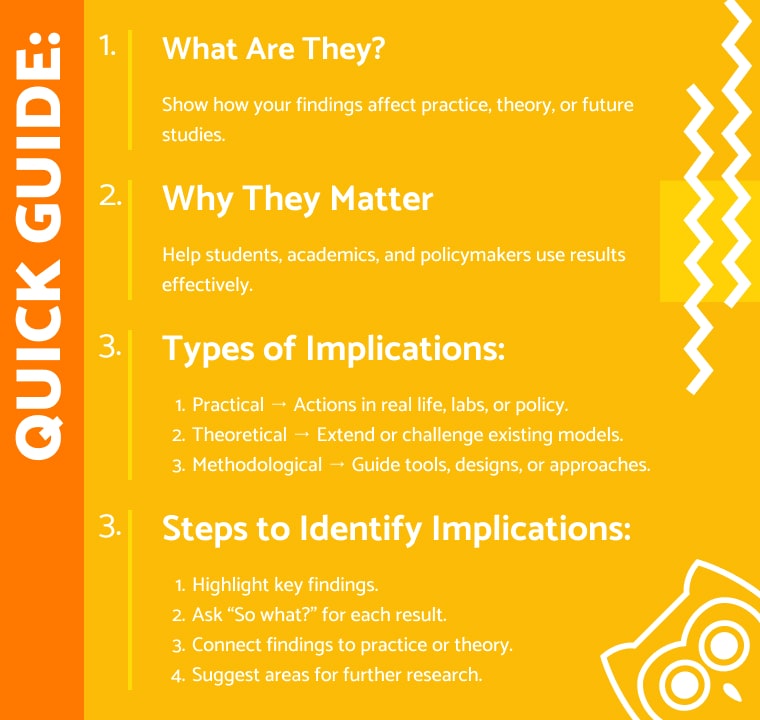What are implications in research? Simply put, they show how your findings affect understanding, practice, or future studies. They help students, academics, and policymakers see the value of study results.
Identifying implications clarifies what actions, changes, or recommendations follow from a study. For example, a research paper writer may suggest new experiments, policy adjustments, or teaching methods based on results.
This article explains different implications, gives examples, and shows how to apply them. You will learn how to interpret findings and connect them to practical and theoretical outcomes by reading it.

What Are Implications in Research?
To define implications in research, we need to see them as the bridge between results and their impact.
While the main findings describe what the study uncovered, the implications explain what these discoveries mean for future inquiry or practical use.
Consider a research paper on urban agriculture. Its key findings include the effect of soil nutrients on plant yield. Accordingly, the study results show how this informs better farming methods or guides the study’s parameters for future experiments. Clear, specific suggestions help other researchers or policymakers apply knowledge effectively.
In short, outcomes and recommendations go beyond reporting numbers. They show how findings connect to broader contexts, provide actionable advice, and form the foundation for implications and recommendations in academic writing.
Definition and Core Concept
So, what does implications mean in research? Simply put, they are the significance of results. A study might reveal a pattern, but outcomes explain why it matters, who it affects, and what can be done next.
For example, a small experiment tracking light intensity and plant growth can lead to a new understanding of optimal growth conditions. The previous study might have overlooked microclimates, and your findings fill that gap. The distinction is clear: results tell you “what,” implications tell you “so what.”
Even a brief research paper benefits when they are highlighted. They give context, suggest future directions, and show readers how to use the information meaningfully.

Importance of Identifying Implications
Identifying implications ensures your work has a clear purpose and contributes to knowledge or practice. Important implications guide future studies, while crucial ones influence policy, education, or healthcare decisions.
For example, a small-scale study on nutrition in remote communities may reveal changes in diet that improve health. When scaled, the findings suggest broader practices that benefit larger populations. As mentioned earlier, linking results to practical use strengthens your paper. Using the importance of scope and delimitation clarifies boundaries and provides precise implications and recommendations.
Types of Research Implications
Some results affect everyday life, while others expand theory. Thus, both practical and theoretical implications show why a study matters. In short, they explain how findings shape knowledge and guide decisions in certain practices.
Theoretical implications deal with ideas, concepts, and models. Practical ones show how outcomes affect people or institutions, like healthcare providers or teachers. Both kinds also raise new questions for further investigation.
Peer reviewers often check whether implications are clearly explained. Without well-described implications, studies may feel like raw data. With them, research becomes a roadmap others can follow.
Practical Implications
It is about the direct effect of study results on life outside the lab. Practically, it is about what changes, actions, or real-world recommendations can follow.
Findings can drive small or large societal changes. For example, a study on soil nutrients may shape farm policies. A survey on student focus may lead to new school schedules.
In medicine, results can guide a target population toward safer habits, which is often discussed under the term clinical implications meaning the impact of research on healthcare practice and patient outcomes.
Practical outcomes also cover technological implications, social implications, or even political implications. Each shows how studies connect to people and institutions. Such notes help bridge the gap between discovery and daily use when explained clearly.

Theoretical Implications
While practical implications focus on real-world change, theoretical implications deal with ideas and models.
Theory looks beyond use. It asks if findings support or challenge existing theories.
The theoretical implications show the main differences between what we expected and what the data proved. For instance, a test may confirm an old model of group behavior. Another study found that patterns in decision-making break the old rules.
Consequently, such work produces clear research recommendations. These can refine study methods, open debate, or inspire new branches of study. In this way, implications do not just end a project; they extend the academic conversation.
Methodological Implications
Methodological implications focus on tools and methods. They explain how research design or data collection choices influence results.
Methodological notes show how choices of research design or data collection shaped results.
They guide researchers in choosing future paths. Thus, an unusual survey tool may offer important implications for a research field. Another trial may prove an old test weak, calling for the change of existing methods.
Students often ask about both the implications of tools and outcomes. For example, a new sensor could improve accuracy in one study and inspire new research examples in another.
Note: Clear structure and layout, such as formatting paper in IEEE style in technical fields, will make methodological notes easier to follow and replicate.
Difference Between Implications and Recommendations
How do implications differ from recommendations? Implications explain the findings, while recommendations suggest specific actions based on those findings.
- Implications highlight the significance of results. For example, a study showing that crop rotation improves soil fertility implies that traditional farming methods may need adjustment.
- Recommendations tell farmers to implement rotation schedules or adjust planting techniques.
Social research findings about peer influence imply that classroom dynamics affect learning outcomes. A recommendation would be to introduce mentorship programs or peer-led workshops. In STEM labs, discovering sensor errors implies limitations in data collection. A recommendation might be to upgrade equipment or redesign experiments.
Implications are “so what?” statements. Recommendations are “what to do next?” statements. Both are crucial, but they serve different purposes in academic writing.
How to Identify and Analyze Research Implications?
How can you find meaning in research results? The best way is to look for patterns and connect them to broader work.
Research implications examples often appear in the discussion section. Here, writers explain what outcomes mean, what still needs further research, and where subsequent research could go.
When writing research implications, consider two things: what the findings prove now and how they can guide others later. This helps researchers provide a clear path for future studies. Well-written implications make a study more than a paper — they make it a starting point.
👉 A handy resource is tips for the discussion section, which reminds students to move beyond summary and show the bigger picture.
Step-by-Step Approach
What is the best process? Break it into small moves.
- Look at the data. See what the findings suggest about your question.
- Check trends and surprises. The present study may show things that other researchers missed.
- Ask what the research makes possible in theory and practice.
Clear notes create examples of implications in research. They show how small results can change a bigger debate. Accordingly, good implications will prove that one research project adds weight to the field as a whole.
How to Write the Implications Section?
Writing doesn’t have to be complicated. Follow these clear steps to make your research useful and easy to understand.
Step 1: Identify Key Findings.
- Look at your results and highlight the most important discoveries.
- Example: A study found that soil rotation increases crop yield.
Step 2: Ask “So What?”.
- For each finding, ask how it affects practice, theory, or future research.
- Example: “This result can guide farmers in crop rotation planning.”
Step 3: Connect to Practice or Theory.
- Explain how your findings apply outside the study.
- Example: In tech labs, findings on small sensors led to a new teaching method for precision experiments.
Step 4: Suggest Future Study.
- Point out gaps or new questions your study raises.
- Example: Further trials could test water use efficiency across soil types.
Step 5: Keep it Clear and Concise.
- Use short sentences and one idea per paragraph.
- Avoid jargon. Focus on practical advice and actionable insights.
Questions to Ask
- “What do these findings mean for the field?”
- “How can this inform practice or policy?”
How do you test if your analysis is strong? Use guiding questions.
- “Do these research findings open space for further research studies?”
- “What future directions or further exploration should follow?”
- “What do they mean for practice, policy, or theory?”
These are good strategies for both students and researchers. Some studies also show the clinical implications in research, such as safer trials or faster tests.
By asking such questions, you explain your data and provide implications that can clearly and usefully shape future research studies!
Common Examples of Research Implications
What do study insights look like in practice? They show how findings affect real-life decisions, methods, or policies.
- Health / Medicine: A study found that adjusting patient sleep schedules improves recovery times. Key features of this research led to research recommendations for hospitals, such as adding rest periods and guiding further research on staff scheduling.
- Social Sciences: Researchers tested peer collaboration in classrooms. The study found that structured storytelling increased engagement and reduced conflicts. This inspired a new teaching method and other research examples in educational design.
- STEM / Technology: A robotics project tracked motion sensor errors. Key features revealed patterns in measurements. Labs applied research recommendations for calibration and designed future research projects to refine these tools.
- Agriculture / Environmental Studies: A study found that soil rotation boosts crop yields, and another project mapped water usage in crops. Both research examples informed farmers’ practices and suggested future research in sustainable farming.
- Aboriginal Culture / Anthropology: A project documenting traditional food preservation methods revealed unique microbial patterns. These research examples guided culturally informed nutrition programs and opened further study into indigenous techniques.
Small, well-analyzed findings often ripple into wider practice. Students can use these examples to link results in essays, research papers, or presentations, showing both practical and theoretical relevance.
5 Common Challenges in Drawing Study Results
| Challenge | Description | Impact on Results |
| Overgeneralization | Findings may reflect only certain subgroups, not the entire population. | Leads to negative implications if recommendations are applied too broadly. Researchers should note limits in the discussion section. |
| Misinterpretation of Results | Previous studies may be misread or compared incorrectly. | Research implications discuss how findings align or conflict with earlier work. Tone reflects careful analysis, avoiding assumptions. |
| Lack of Context | Missing follow-up data or situational details can obscure findings. | Outcomes and recommendations may be skewed if context is ignored. Researchers must clarify boundaries for the proper use of results. |
| Confusing Findings with Implications | Students sometimes treat raw findings as actionable guidance. | A clear distinction between research and implications is crucial. Research must show both data and what it means for future studies. |
| Questions Raised but Unanswered | Some findings generate more questions than answers. | Outcomes and recommendations cover these questions to guide subsequent studies and prevent gaps in interpretation. |
How to Communicate Study Outcomes Effectively?
How should results be shared? Clear writing makes them useful.
In academic writing, the implications must be sharp and short. Show links to writing recommendations or action steps. Additionally, use evidence-based claims, not guesswork.
Tables or graphs in the discussion section can better show key findings than long text. Moreover, researchers should add concluding paragraphs that tie results to practice.
Sample phrases in papers:
- “These findings highlight…”
- “This research suggests new paths…”
- “The implications extend to…”
Such a style helps readers see meaning without confusion.
Summing Up
What should the conclusion section do? It must close the loop.
A short summary should cover the definition, types, and why research recommendations matter. It should also include both theory and practical implications.
Remind researchers that strong findings often point to further research implications. Indeed, each project should build on others, not stand alone.
The final note is simple: treat implications in research with care. Results guide people, so they must be shared with fairness and ethics!





